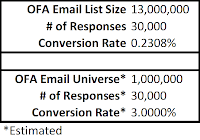Does the list make the candidate?
by admin at 1:09am, March 16, 2009 | E-Campaign, Email, Voter Contact, Voter FileThe Washington Post recently did a story about how the organization “Obama For America” (OFA) is poised to flex their organizing muscle for the Presidents budget proposal. There are plenty of stories out there that talk about this move from a political aspect and whether it will be effective but many outlets are under reporting the premise that enabled OFA to mobilize millions in support of the Presidents agenda. Alex Vogel, a republican political consultant hits it on the nose at the end of the article,
“If mail lists made Karl Rove, e-mail and cell lists made Obama,” he said, referring to the former White House deputy chief of staff. “But what good is a list if your message is bad?”
The point is this – “the list” or database is the essential tool for a win. As Alex Vogel points out it was the list that made the candidate (or the consultant). I can’t stress the “tool” portion of that statement enough, a list is tool and nothing more – just as a good hammer can help you build a house simply having the hammer doesn’t mean you can build it.
According to TechPresident.com Obamas email list is around 13 million email addresses. If you match that with the reported responses in the Wapo article (30k) that puts the conversion rate right around .23%. The article does note that only the people who “attended or hosted” an Obama house party would receive an email so it is safe to assume that not all 13 million email addresses were used – probably a lot less than half received an email.
 I am going to go way off the reservation here and guesstimate that 1 million emails were sent out – at that number the OFA is looking at a 3% conversion rate. A rate that is incredibly low for an opt-in list like that. So, that begs the question, is the list bad (highly unlikely) or is the message not resonating? (and yea this is assuming I am right that they sent out around 1 million emails – even if they sent out 500k a 6% conversion rate is probably not great)
I am going to go way off the reservation here and guesstimate that 1 million emails were sent out – at that number the OFA is looking at a 3% conversion rate. A rate that is incredibly low for an opt-in list like that. So, that begs the question, is the list bad (highly unlikely) or is the message not resonating? (and yea this is assuming I am right that they sent out around 1 million emails – even if they sent out 500k a 6% conversion rate is probably not great)
I will leave you all to debate that question, but OFA has the list/database which is half the battle and they will continue to wield it until it attrites away or the message resonates.